Crusades
In the video "Crusades," by Mr. Corwin, available on YouTube (9:35), a middle-school history teacher explains it all, with good visuals. It is appropriate for use on day 3.
The song/video "Jesus the Lord,” by Roc O’Connor and the Saint Louis Jesuits," available on YouTube (6:24) with lyrics, is best used on day 4.
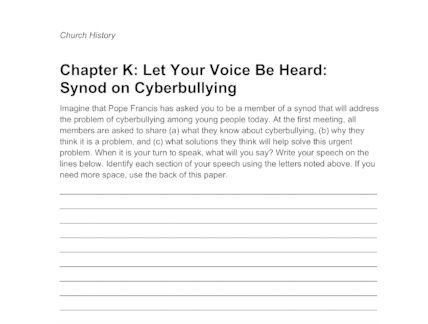
Students are challenged to write a speech as if they were a member of Pope Francis’ synod addressing the problem of cyberbullying.
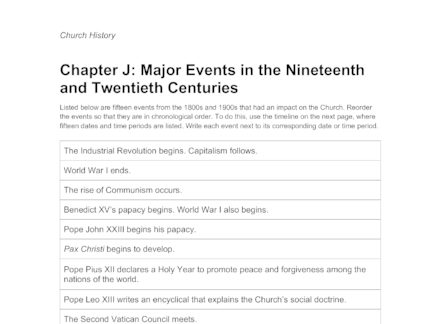
Students order important events from the 19th and 20th centuries.
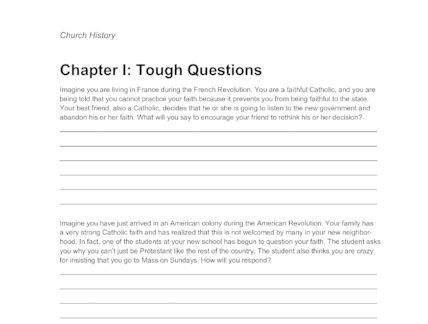
The worksheet poses several questions that ask students to reflect on how they would have stood up for their faith during the French and American Revolution.
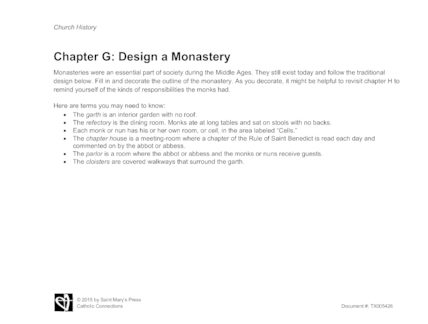
Students design a monastery based on the responsibilities and needs of the monks.
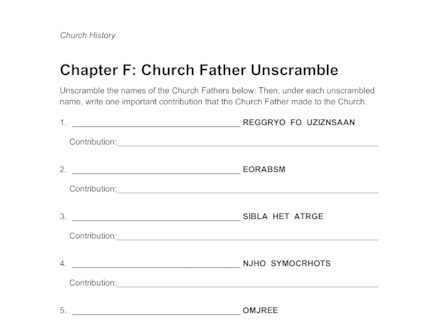
Unscramble the names of the Church Fathers below. Then, under each unscrambled name, write one important contribution that the Church Father made to the Church.
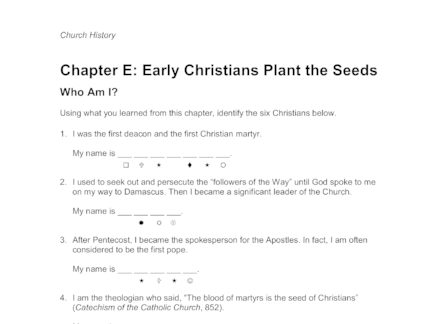
On this worksheet, students solve clues to list the names of important early Christians. These answers are then used to decode a secret message.
The video "Pope Francis Joins Religious Leaders of Different Faiths, in Fight against Modern Slavery," by Rome Reports, available on YouTube (3:07), shows people of faith working together to eliminate one of the world’s greatest evils, slavery. It is best …
The video "Pope Francis in Action," by Catholic News Service, available on YouTube (1:26), features the Pope at World Youth Day 2013. It is best used on day 3 or day 4.
The video "Pope Francis Speaks," by Catholic News Service, available on YouTube (9:27), is a video of the Pope’s remarks from the balcony of Saint Peter’s on the night of his election. It is best used on day 3.
The video "Pope Paul VI—The Pilgrim Pope," by Salt and Light, available on YouTube (2:37), chronicles Pope Paul VI’s role in the Second Vatican Council, increasing Christian unity—including lifting the excommunication of the Greek Orthodox Patriarch—and bringing the Good News …
The video "Vaticanum Secundum (Opening of the Second Vatican Council)," by Caeremoniale Romanum, available on YouTube (3:33), is the opening ceremony of Vatican Council II. The first of three videos. In Italian (no subtitles), but the pictures are worth a …
The video "The Catholic Church during World War II," by heptagonofnerds, available on YouTube (2:47), is done by a teen and addresses the issue of the Catholic Church and the Jews. It presents realistically what Pope Pius XII and the …
The video "St. Thomas More," by catholicnewsagency, available on YouTube (2:01), shows the strong Catholic faith of Saint Thomas More and how he stood up to King Henry VIII instead of recognizing the Church of England. It is best used …
The video "Turning Points in History—The Reformation," available on YouTube (2:28), is a good presentation of the conflict between Martin Luther and the Catholic Church. It is best used on day 2.
In the video "Crusades," by Mr. Corwin, available on YouTube (9:35), a middle-school history teacher explains it all, with good visuals. It is appropriate for use on day 3.
The video "Fall of the Roman Empire," available on YouTube (12:44), is an entertaining crash course in Roman history. Two segments show the differences between the Eastern and Western Empires (begin at 5:06) and the Eastern and Western Churches (begin …
The video "The Nicene Creed in Original Greek," proclaimed by Pope Benedict XVI and the Orthodox Patriarch of Constantinople, Bartholomew I, is available on YouTube (2:28) with excellent photos of the two prelates, art, and icons. It is best used …
The video "Catholic History in Less than Five Minutes: (4) The Early Church Fathers," by Pat McNamara, is available on YouTube (4:47). It is best used on day 1.
The video "Jesus Urging His Disciples to Stay Awake," by Turnback to God, available on YouTube (5:32), is an animated account of Jesus at prayer in Gethsemane (an amalgamation of Gospel accounts). It is best used on day 4.
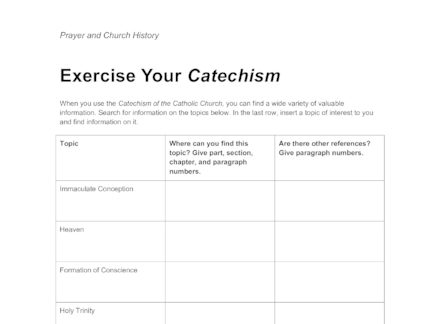
This handout guides students as they become familiar with searching for information in the Catechism of the Catholic Church.
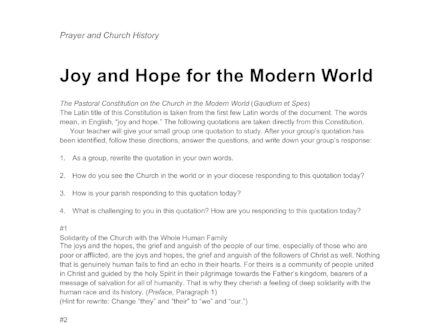
This handout provides questions for students to reflect on and answer as they read quotations from this Constitution.
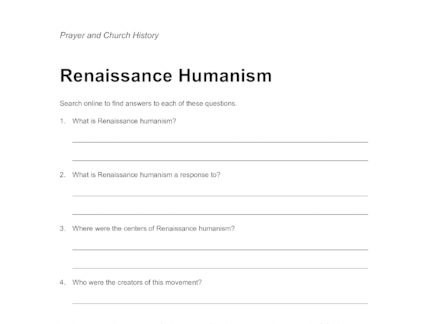
This handout provides questions for students to research on the Internet about Renaissance Humanism.
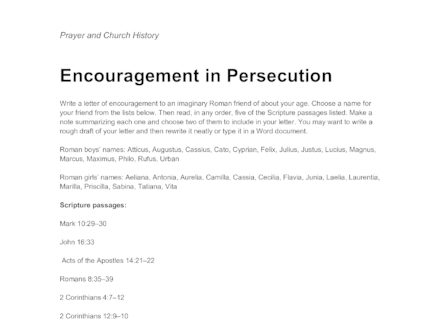
This handout outlines a writing assignment in which students write a letter to an imaginary Roman friend who is enduring persecution in the Empire. Students must use Scripture passages to help them in the writing process.
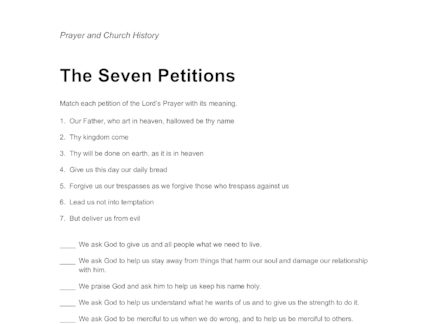
On this handout, students match the meaning to each line of the Lord’s Prayer.
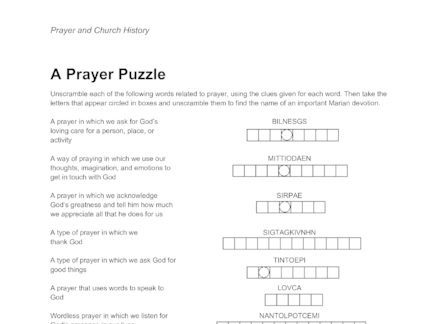
On this handout, students must use clues to unscramble words related to prayer.
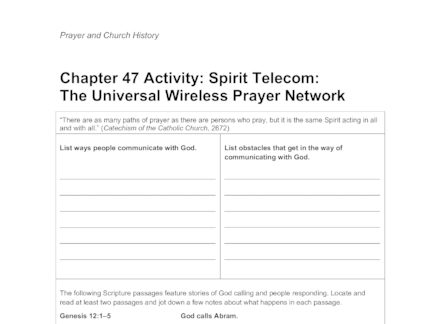
This handout guides students as they locate and read various Scripture passages focusing on the many way God calls us to prayer.
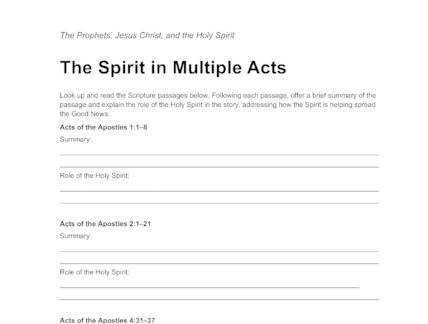
Students look up and read several passages that the Holy Spirit. The worksheet asks students to summarize each passage and describe the role of the Holy Spirit in spreading the Good News.
The song/video "Burning in My Soul," by Matt Maher, available on YouTube (3:45), provides a nice connection to Pentecost and the modern listener and is appropriate for use on day 4.
The song/video "Forever (Live)," by Kari Jobe, available on YouTube (6:50) with lyrics, is a good opening prayer for day 4. The video can be shortened to 4:38.
The video "Resurrection Cartoon," available on YouTube (3:05), offers a fun portrayal of the Resurrection and is appropriate for use on day 1.
The video "Mary’s Role in the Catholic Church," available on YouTube (3:52), is used in the "She Is Your Mother" activity on day 2.
The song/video "Mary, Did You Know? (The Bible)," by CeeLo Green, available on YouTube (4:12), incorporates video about the life of Mary and Jesus and is also appropriate for day 1.
The song/video "Mary, Did You Know?" by Pentatonix, available on YouTube (3:24) with lyrics, is an a cappella rendition that is appropriate for day 1.
The video "Mary in 2 Minutes," available on YouTube (2:43), addresses many important questions regarding Mary to support day 1 activities.
The video "The Day of the Dead," available on YouTube (3:49), offers a good overview of the Mexican celebration for the "Day of the Dead" activity on day 4.
The song/video "Christ Is Risen," by Matt Maher, available on YouTube (4:55) with lyrics, can be used for prayer on day 1.
The song/video "I Will Rise," by Chris Tomlin, available on YouTube (5:02) with lyrics, is good for prayer any day this week.
The video "How Can Jesus Be Both God and Human?" available on YouTube (2:42). This short video by Bishop Robert Barron explains the two natures of Jesus and some of the false teachings that the early Christian communities were battling. …
The video "Fully Human, Fully God," by The Skit Guys, available on YouTube (14:37), is used for the "True God and True Man" activity on day 3. Cue to 12:00 for the pertinent 2:37 segment.
The video "Sermon on the Mount: The Beatitudes," available on YouTube (2:08), is used for the "Happy Are You!" activity on day 2. The first 1:15 is sufficient.
The song/video "Blest Are They—The Beatitudes," available on YouTube (8:19), is used for the Engage activity on day 2. The segment between 6:01 and 6:50 focuses on the lesson’s topic of persecution. The first 6:50 is worth showing for context …
The video "The Monastic Life, an Opportunity for the Church," available on YouTube (2:55), provides background material on monastic life for day 3.
A simple search of "vocation stories" on YouTube provides many possibilities. Preselect two or three videos based on your time limitations, student familiarity with certain orders, and potential interest. "The Story of a Voca-tion," posted by OrderofPreachers (3:33), and "Vocation …
The song/video "Go Make a Difference Lyrics," by Steve Angrisano and Tom Tomaszek, available on YouTube (3:03), can serve as opening prayer any day.
The song/video "Hands and Feet," by Audio Adrenaline, available on YouTube (4:04) with lyrics, enhances the Pray It! activity at the start of day 2.
The song/video "Breath of Heaven (Mary’s Song)—The Nativity Story," by Amy Grant, available on YouTube (5:20), tells of the calling of Mary to bring Christ into the world. A video with scenes from the movie The Nativity Story illustrates the …
The song/video "Big House," by Audio Adrenaline, available on YouTube (3:29) with lyrics, offers an alternate, more upbeat opening prayer for any day.
The song/video "One Spirit, One Church," by Kevin Keil and Maryanne Quinlivan, available on YouTube (3:56), offers a good opening prayer for any day this week.
The song/video "1 Timothy 4:12—Seeds Family Worship—‘Young,’" available on YouTube (2:05), is used for the "Be an Example" activity on day 4. The first 1:00 is sufficient.
The song/video "Heaven in the Real World," by Steven Curtis Chapman, available on YouTube (4:20), is used for the "Gear Up" activity on day 3.
The video "Veggie Tales Madame Blueberry," available on YouTube (1:27), is used for the Engage activity on day 2. Consider starting at the 0:24 mark.
The video "C4: Ignite Your Catholic Faith—What Are the Marks of the Church?" is available on YouTube (3:32), and is used for the "On Your Marks" activity on day 1.
The song/video "Run the Race," by Paul Taylor Smith, available on YouTube (4:28), can be used for prayer any day and also complements the "Go the Distance" activity on day 4.
The video "Pope to Youth: ‘Forget about false idols. Only God offers true hope,’" available on YouTube (3:10), is used for the "Think Positive!" activity on day 4. The pertinent quotes begin at the 0:56 mark.
The video "Trip Lee—Reflections on Romans 8," available on YouTube (2:59), is used for the "Clear the Way" activity on day 4.
The song/video "Gospel Music by Shai Linne, 116 Clique (Romans)," available on YouTube (4:55), is used for the “Clear the Way” activity on day 4. Though the video is 4:55, the song concludes at the 4:11 mark. It is helpful …
The video "Acts 15 The Council of Jerusalem," available on YouTube (3:52), is used for the "Paul Is Appalled" activity on day 2.
The Catholic News Service video "Inculturation: The Case of Matteo Ricci," available on YouTube (2:21), provides a clear, concise explanation of enculturation for the chapter project.
The song/video "World Peace Prayer," by Marty Haugen, available on YouTube (4:06), provides a hopeful litany that complements the "Opposites" activity on day 4.
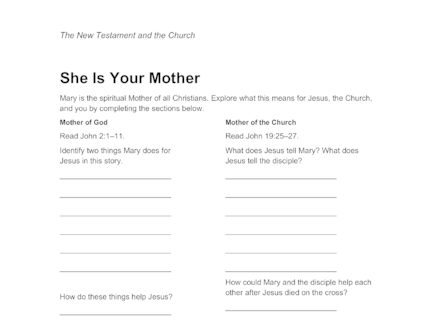
As students complete this worksheet, they will explore what it means when we say that Mary is the Mother of God and the Mother of the Church.

This worksheet guides group members to work together as they identify the importance of the church being “One, Holy, Catholic, and Apostolic”.

Students match symbols from Jesus’ first miracle the wedding feast in Cana with their meaning and significance.

On this worksheet, students read all four Gospel accounts of the resurrection before identifying similarities and differences between them.
This PowerPoint accompanies Chapter B by giving an overview of the Gospel of John.
The video "Matthew 1:1–16: The Genealogy of Jesus Christ," available on YouTube (2:19), is an animation of the lineage of Jesus that shows his connection to the tribe of Judah (see 0:18). It is used on day 3.
The song "Upon This Rock I’m Gonna Build My Church," by Judith Gayle and Shamar Barrett, available on YouTube (4:33), makes a personal statement about faith in a Caribbean style. It is best used on day 4.
This PowerPoint accompanies Unit 2, Chapter 4, by discussing the revelation of God through Scripture and Tradition.
This PowerPoint accompanies Unit 1, Chapter 2, by discussing the development of Trinitarian Doctrine in the early church.

This handout asks students to complete a chart by listing examples of discipleship at the time of Jesus and today.

After reading several articles, students complete this chart by filling in key points about Jesus and the Church.
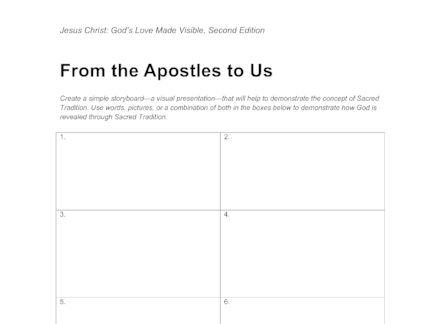
Students create a storyboard to show how God is revealed in Sacred Tradition.

This worksheet has students fill in blanks from Chapter 2, Section 6-8, focusing on the faith changes during the early Church centered on the Trinity.

A lesson plan for lesson 14 in The Catholic Faith Handbook for Youth: Catechist Guide.

A lesson plan for lesson 13 in The Catholic Faith Handbook for Youth: Catechist Guide.
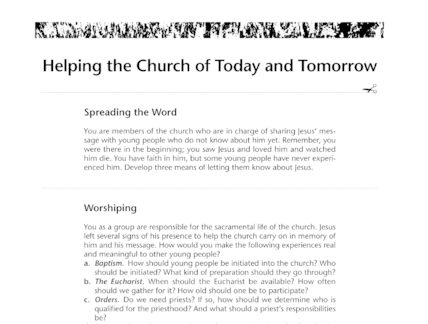
This handout challenges students to reflect on and brainstorm what it would have been like to create Church teachings and rules shortly after Jesus’ death and resurrection.
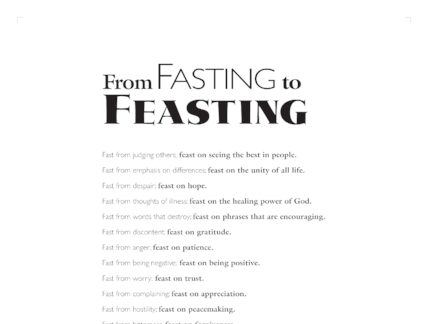
A short prayer that calls us to feast on kindness and compassion towards others.

Jesus has just risen from the tomb. Although you and all the other Christians are overjoyed, you now have to decide what to do. You are one of the followers who has been with Jesus for more than two years. …

It may be easy to think of church councils as having very little to do with our personal life. Yet the themes of Vatican Council II—change and renewal—are ones that we are called to live out for the rest of …
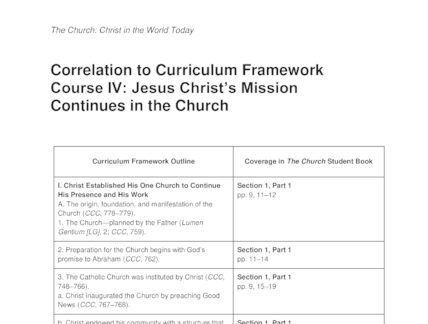
Correlation to Curriculum Framework Course IV: Jesus Christ’s Mission Continues in the Church from The Church: Christ in the World Today.
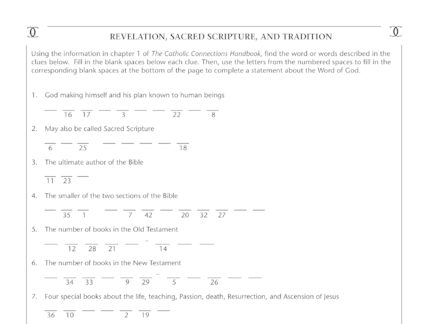
Using the information in chapter 1 of The Catholic Connections Handbook, find the word or words described in the clues below. Fill in the blank spaces below each clue. Then, use the letters from the numbered spaces to fill in …
A brief explanation of tradition versus Tradition. A short video about how Catholic traditions that have been handed down help God reveal himself to us.

A summary of Chapter 26, The Bible: Worshipping God from the Catholic Connections Handbook for Middle Schoolers, Second Edition.

A summary of Chapter 25, Mary and the Saints from the Catholic Connections Handbook for Middle Schoolers, Second Edition.

A summary of Chapter 24, End Things: Heaven and Hell from the Catholic Connections Handbook for Middle Schoolers, Second Edition.
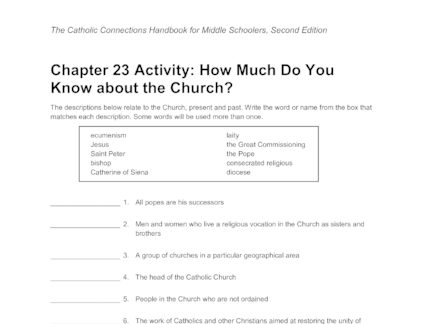
The descriptions below relate to the Church, present and past. Write the word or name from the box that matches each description. Some words will be used more than once.

A summary of Chapter 23, The Structure of the Church from the Catholic Connections Handbook for Middle Schoolers, Second Edition.

A summary of Chapter 22, The Mission of the Church from the Catholic Connections Handbook for Middle Schoolers, Second Edition.

A summary of Chapter 1, Revelation, Sacred Scripture, and Sacred Tradition from the Catholic Connections Handbook for Middle Schoolers, Second Edition.
A personal story about Catholic education.
A personal story about being open in sharing our faith and receiving the faith of others.
A personal story about the mission of the Church to share the good news of salvation with others.
A PowerPoint on The Catholic Faith Handbook for Youth, Third Edition Chapter 14, The Organization of the Catholic Church.
A PowerPoint on The Catholic Faith Handbook for Youth, Third Edition Chapter 13, The Mission of the Catholic Church.
A PowerPoint on The Catholic Faith Handbook for Youth, Third Edition Chapter 4, Faith.
A PowerPoint on The Catholic Faith Handbook for Youth, Third Edition Chapter 2, Knowing God: Reason and Revelation.
A PowerPoint on The Catholic Faith Handbook for Youth, Third Edition Chapter 1, Being Catholic: The “Cliff Notes” View.
A PowerPoint presentation from Church History, Unit 8 on the Vatican II Council.

A list of developments made after the Second Vatican Council that can be cut out.

Work with your group to complete the section of this handout that corresponds to your assigned topic.

A list of vocabulary words for Unit 8 of Church History: Apostolic Times to Today. The defined words include Body of Christ, catechists, Catholic Action, collegiality, concordat, exegesis, fascism, Gregorian chant, Marks of the Church, Marxist, new evangelization, pastoral, and …

The rubric for the final performance task options for Unit 8 of Church History: Apostolic Times to Today. The options include writing journal entries from World War I to today, or writing an original graphic novel or comic book about …

The final performance task options for Unit 8 of Church History: Apostolic Times to Today. The options include writing journal entries from World War I to today, or writing an original graphic novel or comic book about the Church in …
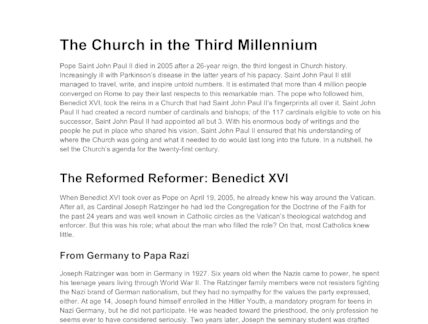
An excerpt from The Catholic Church: A Brief Popular History, by Cynthia Stewart that discusses background on the Church in the Third Millennium.
A PowerPoint presentation from Church History, Unit 7 on Catholics Come to America.

Write your name and the names of your group members at the top of this handout. As a group, research the history of our school and complete the following questions. For each answer, note the source of your information. This …

A list of vocabulary words for Unit 7 of Church History: Apostolic Times to Today. The defined words include capitalism, communism, deterrence, social doctrine, social encyclical, socialism, and subsidiarity.

The rubric for the final performance task options for Unit 7 of Church History: Apostolic Times to Today. The options include creating a children’s book about the Catholic Church in the United States, or creating a PowerPoint presentation about the …

The final performance task options for Unit 7 of Church History: Apostolic Times to Today. The options include creating a children’s book about the Catholic Church in the United States, or creating a PowerPoint presentation about the Catholic Church in …
A PowerPoint presentation on The French Revolution from Church History, Unit 6.
A PowerPoint presentation on Pope Pius IX and the First Vatican Council from Church History, Unit 5.

Work with your group to create a six-panel (folded) brochure describing the history and work of Vatican Council I.
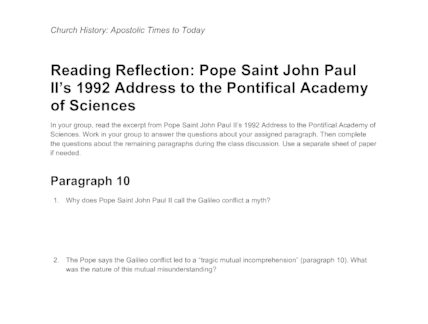
In your group, read the excerpt from Pope Saint John Paul II’s 1992 Address to the Pontifical Academy of Sciences. Work in your group to answer the questions about your assigned paragraph. Then complete the questions about the remaining paragraphs …

A list of vocabulary words for Unit 6 of Church History: Apostolic Times to Today. Defined words include deism, dogma, empiricism, ex cathedra, fideism, pantheism, rationalism, and Reign of Terror.

The rubric for the final performance task options for Unit 6 of Church History: Apostolic Times to Today. The options include coming up with interview questions for Pope Pius IX, or creating the front page of a newspaper from the …

The final performance task options for Unit 6 of Church History: Apostolic Times to Today. The options include coming up with interview questions for Pope Pius IX, or creating the front page of a newspaper from the day after Vatican …

A book excerpt from The Catholic Church: A Brief Popular History by Cynthia Stewart about strengthening the papacy during Vatican I.
A PowerPoint about The Dominican Missionaries in the Spanish Colonial Period from Church History, Unit 5.
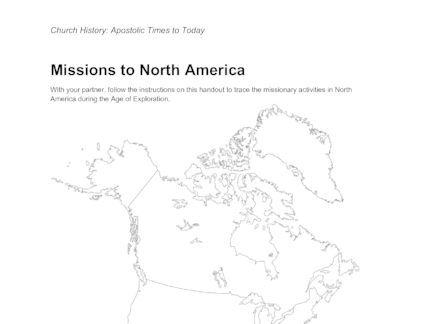
With your partner, follow the instructions on this handout to trace the missionary activities in North America during the Age of Exploration.

Complete this handout as you read the excerpt from Bartolomé de las Casas’s A Brief Account of the Destruction of the Indians. Use a separate sheet of paper as needed.

Complete this handout as you view the film The Mission (1986, 125 minutes, rated A-III and PG).

Complete this mind map as you listen to the presentations of your classmates. Attach lines and boxes to each topic to add notes.

A list of vocabulary words for Unit 5 of Church History: Apostolic Times to Today. The words that are defined are Congregation for the Propagation of the Faith, conquistadors, and enculturation.

The rubric for the final performance task options for Unit 5 of Church History: Apostolic Times to Today. The options include creating a gallery of original art on the missionaries of the church in the age of exploration, or creating …

The final performance task options for Unit 5 of Church History: Apostolic Times to Today. The options include creating a gallery of original art on the missionaries of the church in the age of exploration, or creating a Christian missionary …

Let’s take a glance around the globe to see some of the missionary efforts that began during the Fifteenth through Seventeenth centuries.
A PowerPoint on The Popes of the Renaissance from Church History, Unit 4.
A PowerPoint on Martin Luther and His Complaint against the Church from Church History, Unit 4.

Your group has been assigned to create a brochure about one of the two major religious orders to emerge during the Catholic Reformation: the Jesuits or the Carmelites. Imagine that you are members of this new religious order during the …

Answer the following questions as a group.

Read these five excerpts from Martin Luther’s Ninety-five Theses. Then answer the reflection questions. Use a separate sheet of paper if you need more room.

Use this handout to take notes from the in-class presentation on article 28, “Luther’s Complaint,” in the student book.
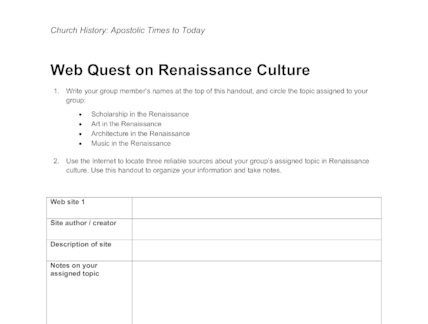
Write your group member’s names at the top of this handout, and circle the topic assigned to your group. Use the Internet to locate three reliable sources about your group’s assigned topic in Renaissance culture. Use this handout to organize …

A list of vocabulary words for Unit 4 of Church History: Apostolic Times to Today. The defined words include Apocrypha, College of Cardinals, deuterocanonical, grace, humanism, justification, merit, predestination, and theocracy.

The rubric for the final performance task options for Unit 4 of Church History: Apostolic Times to Today. The options include making a video about the Protestant reformation and the Catholic reformation, or writing a journal from the perspective of …

The final performance task options for Unit 4 of Church History: Apostolic Times to Today. The options include making a video about the Protestant reformation and the Catholic reformation, or writing a journal from the perspective of someone witnessing the …

Excerpts from the address of Pope Benedict XVI on Thursday, April 17, 2008 at the John Paul II center in Washington D.C.

An article about The Council of Trent, excerpted from The Catholic Church: A Brief Popular History, by Cynthia Stewart.
A PowerPoint on medieval teachings on the Eucharist from Church History, Unit 3.

Complete this handout with your partner as you review article 24, “Scholastics and Medieval Universities,” in the student book.

Complete this handout with your group as you review article 21, “Challenges to the Papacy,” in the student book.

A list of vocabulary words for Unit 3 of Church History: Apostolic Times to Today. The words defined are chancel, conciliar movement, Divine Office, friars, Great Western Schism, indulgence, Medieval Inquisition, mendicants, mystic, nave, scholasticism, and Spanish Inquisition.

The rubric for grading the final performance task options for Unit 3 of Church History: Apostolic Times to Today. The options include creating a podcast about the Church in the High Middle Ages, or creating a journal of a Christian …

The final performance task options for Unit 3 of Church History: Apostolic Times to Today. The options include creating a podcast about the Church in the High Middle Ages, or creating a journal of a Christian in the High Middle …
A PowerPoint for Church History, Unit 2 Church Councils and Doctrinal Development.

Write a five-paragraph essay summarizing changes and significant events that affected the Church from the 700s through the 800s. Your essay must include suitable citations. You may use article 17, “Charlemagne: Holy Roman Emperor,” in the student book as a …

A list of vocabulary words for Unit 2 including abbot, abbess, antipope, Arianism, charism, Christendom, consubstantial, Doctor of the Church, Ecumenical Council, Fathers of the Church, feudalism, filioque, Franks, hermit, hypostatic union, iconoclasm, illuminated manuscript, Logos, papal bull, Papal States, …

The rubric for the final performance task options for Unit 2 of Church History: Apostolic Times to Today. The options include creating a children’s picture book, or making a PowerPoint presentation for a parish community.

The final performance task options for Unit 2 of Church History: Apostolic Times to Today. The options include creating a children’s picture book, or making a PowerPoint presentation for a parish community.

Looking back over the first 1500 years of Church history, the picture is not one of perfect harmony. Political conflicts, religious controversies, invasions, and condemnations created sometimes occasional, sometimes lasting rifts. For the Eastern Church and the Latin Church, the …

A reading about the early Christian debate over the divinity of Jesus.
A PowerPoint from Church History, Unit 1, Early Christian Worship in the West and East.

With your group, read Saint Ignatius of Antioch’s letter to the Romans. Then answer the following questions.

Use a separate sheet of paper to answer the following questions. Each group member must turn in an answer sheet.

A list of vocabulary words for Unit 1 including apologist, Apostle, Apostolic Succession, bishop, charism, Christian, college of bishops, covenant, deacon, Deposit of Faith, Edict of Milan, emperor, Eucharist, Church Fathers, Magisterium, martyrdom, Messiah, New Covenant, persecution, presbyter, priest, providence …

A rubric for the final performance task options for Unit 1 including dramatic monologues, or a professional portfolio for an apologist.

Activities for Chapter 15 The Last Things, including a core activity, core activity extension, and additional activities.
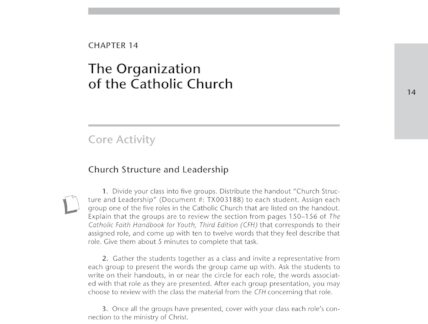
Activities for Chapter 14 The Organization of the Catholic Church, including a core activity, core activity extension, and additional activities.

Activities for Chapter 13 The Mission of the Catholic Church, including a core activity, core activity extension, and additional activities.

Activities for Chapter 4 Faith, including a core activity, core activity extension, and additional activities.

Activities for Chapter 2 Knowing God: Reason and Revelation, including a core activity, core activity extension, and additional activities.

Activities for Chapter 1: Being Catholic, including a core activity, core activity extension, and additional activities.

The Precepts of the Church direct us to participate in the sacramental life of the Church so that we might be nourished for living a moral life. Following are the Precepts of the Church as designated by the Catholic bishops …

Descriptions of how each person of the trinity is present in the liturgy.

The structure of the Catholic Church can be pictured as a series of concentric rings, as shown in the following diagram. Each ring represents a special area of responsibility within the Church. As the circles get smaller, the roles are …

Scripture verses about the Church as the people of God, the body of Christ, and temple of the Spirit.

Find the biblical passages assigned to you, and then write on the line the words from the Mass that refer to or echo the passage.
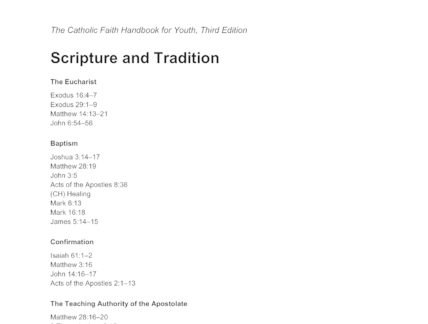
Connections between Scripture passages and Catholic Traditions.

The Precepts of the Church are rooted in Scripture and Tradition. Do your best to locate Old and New Testament passages (in the Old Law and the New Law) that support each of the following precepts.

The different postures and gestures that take place during Mass.

The lesson learning objectives and content summary for Lesson 15, The Last Things.

In your visit to a different Christian Church, be prepared to ask the church’s representative some thoughtful questions about what they believe, their mission, and their worship. Here are some questions to start with. You might also think of other …

The lesson learning objectives and content summary for Lesson 14, The Organization of The Catholic Church

The lesson learning objectives and content summary for Lesson 13, The Mission of the Catholic Church.

The lesson learning objectives and content summary for Lesson 12, The Holy Spirit.

The lesson learning objectives and content summary for Lesson 11, Jesus’ Resurrection.

The lesson learning objectives and content summary for Lesson 10, Jesus’ Death.

The lesson learning objectives and content summary for Lesson 9, Jesus’ Message and Mission.

The lesson learning objectives and content summary for Lesson 8, Jesus Christ: True God and True Man.

The lesson learning objectives and content summary for Lesson 7, The Promise of a Messiah.

The lesson learning objectives and content summary for Lesson 6, The Human Person.

The lesson learning objectives and content summary for Lesson 5, God our Father.

The lesson learning objectives and content summary for Lesson 3, The Bible’s Big Picture.